When I’m writing these words, I have a flashback to gloomy November days in 2008. Several months earlier I graduated from the National Technical University of Ukraine with a bachelor’s degree in Power Engineering.
For me, the future was uncertain, and I didn’t even dream of becoming a data scientist, nor knowing much about such a profession. I think you feel the same. But, unlike me in 2008, you know that you want to learn data science and have numerous opportunities to choose.
In those days, I wished to find a trustworthy guide on data science courses that would tell me how to start my career and what subjects I should study during my learning journey. Over ten years ago, there was little information about data science courses on the Internet. In contrast, in 2020, we have too many online programs to enroll.
Like many other data scientists, I took online courses to dig deeper into the subject. And it took me a while to realize which program is worth my attention or that is just a waste of time.
Now that I have years of experience in data science, I see what courses are worth taking. I also see that the demand for data science specialists outstrips supply.
So, I decided to write this article about online courses for data scientists to help beginners in data science. I hope it will help you to overcome the struggle of finding decent online programs.
To help you become a job-ready specialist, I gathered certification programs offered by private companies, such as Google and IBM. I also listed online programs on data science from Coursera, a learning marketplace.
But before digging into the details, let’s answer a simple question. Do you need to look for a data science online course or a certification program?
Data Scientist Certificate Programs vs. Certification: What is best for you?
Words “Certificate” and “certification” sound almost similar. But there are differences in their meaning, as well as learning outcomes.
So, let’s set the record straight.
A certificate program includes one course or series of lectures from education institutions. Such programs will give you specific knowledge in a particular field. After you finish a learning program, you receive a certificate that demonstrates your understanding of content from a learning institution.
You’ll need to take a certificate program if you have little to no experience in the subject. But owning a certificate doesn’t mean your knowledge and skills meet industry standards.
A certification is a more valuable achievement because it includes an experience and education component and requires passing an exam. In plain terms, a certification determines whether you are qualified enough for the certification standards, determined by independent certification bodies.
To get a certification, you need to have a solid background on the subject and meet standard-setting organization requirements. In some cases, to meet changing environments, you need to renovate your certification every year.
In a nutshell, if you are looking for knowledge and skills training, you need a certificate program from a university. In contrast, certification evaluates your current knowledge and skills against predetermined standards set by independent certification bodies.
Best Data Science learning path: where to start
Before discovering online data science courses, I want to give you a picture of what your working routine as a data scientist will look like.
The work of a data scientist includes several stages. First, you’ll need to develop a statistical model that will analyze the dataset. Then, you’ll apply statistics and mathematical techniques to interpret your result, and finally, visualize it in an understandable format. I described a small part of what data scientists do, but it is enough for you to get a basic understanding.
To prevent you from meaningless hours of searching for where you should start your learning path, I offer my own. The provided pathway shows how I learned data science foundations and moved from one milestone to another to become a data scientist.
Programming: Python and R
Both Python and R are programming languages I use most often. I recommend starting from Python, a high-level programming language because it is beginner-friendly. Python fundamentals, such as data structures and data analysis, will help you develop data analysis models.
You can then start learning R. This programming language for static computing will help you develop statistical software and data analysis. Moreover, R is also an interactive environment for data clearance, transformation, wrangling, and visualization.
Statistics and mathematics
Both statistics and mathematics form the backbone of data science. You’ll need to learn about the main techniques to interpret the results you generated through analytic data models. Such methods as confidence intervals, hypothesis tests, probability theory, likelihood, and common distributions will help you with this task.
You’ll need to learn about such concepts as inferential statistics and exploratory data analysis (EDA).
Data visualization
One of the data scientist’s responsibilities is to extract business insights from raw data. But in most cases, such insights look like a large table of numbers no one except you can read nor understand. To make data analytics results more user-friendly and communicate them to a general audience, you must learn about different data visualization methods.
The next level for a data scientist is creating more sophisticated data analytics models for artificial intelligence and machine learning applications. If you are courageous enough to try it, here is what you’ll need to learn.
Linear algebra
Linear algebra is a part of mathematics, applied across disciplines, including data science. With a solid background in linear algebra, you’ll better understand machine learning and deep learning algorithms. Linear algebra fundamentals include such concepts as matrices and vectors, matrix operations, matrix inverse, and others.
As for linear algebra applications by data scientists, we often use Singular Value Decomposition (SVD) and Principal Component Analysis (PCA) for image decompression and reducing the dimensionality of the data sets.
Machine learning
Machine learning is a more narrow field of data science that deals with programs that learn from experience. To create such a program, you must be aware of the main types of machine learning algorithms. By learning style, ML algorithms could be supervised, unsupervised, and semi-supervised. Then, you’ll need to know about methods to create one or another algorithm.
Deep learning
Deep learning, also known as deep structured learning, is a part of a broader family of machine learning methods based on artificial neural networks. The adjective “deep” in deep learning means that such algorithms leverage multiple layers in the network.
Knowing how to develop deep learning algorithms can create sophisticated systems like image recognition software, deep fakes, and text-to-voice tools.
I have just given a quick overview of an approximate learning path for data scientists. But consider that milestones are due to change depending on your preferences and your employee requirements.
Now that you know how you can begin learning data science, let’s see where you can receive the necessary knowledge and master your skills.
Get Your Data Science Problem Solved within 24 Hours
Learn moreTraining in data science: What are the best courses for data science?
Learning from industry leaders in data science is a more straightforward way to receive theoretical and practical knowledge. For this purpose, I gathered data science courses from IBM, Google Cloud Platform, and Microsoft. I also added data science learning materials from KDNuggets, a data scientists learning community.
So, let’s review the best data science learning programs one by one.
IBM Data Science professional certificate
You might know IBM for creating the first electronic data processing machine in 1957 and SQL, a programming language, in 1974. However, IBM does not limit itself to that.
In 2010 IBM launched Big Data University, a community initiative for providing comprehensive learning paths in data science, big data, and analytics. The mission of this initiative is to nurture a community of skilled data professionals.
Big Data University offers the Data Science Fundamentals Learning Path, free online courses for all applicants. The learning path will prepare you for IBM Data Science Foundations Level 1 and Level 2.
These courses are short by design and follow the “5 x 5” rule.
- The learning path includes 5 courses
- Each course is about 5 hours
- The course consists of 5 modules
- Each module has 5 videos that last for 5 minutes
Data Science Fundamentals Level 1 and Level 2 includes four main courses:
- Data Science 101 (3 hours)
- Data Science Methodology (5 hours)
- Data Science Hands-on with Open Source Tools (5 hours)
- R 101 (5 hours)
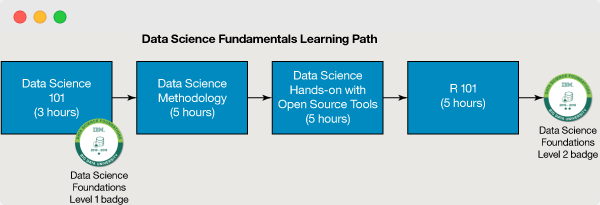
As a result, you’ll earn a Science Foundations Level 1 badge or Data Science Foundations Level 2 badge. You’ll also get solid knowledge in concepts and tools to prepare them for first job and entrepreneur opportunities.
Data Engineer and Data Science courses by Google Cloud Platform
Consider Data Engineering on the Google Cloud learning path if you want to learn about big data, AI, and ML.
All courses are available on Coursera, an online learning platform. The platform offers a 1-month free trial for this course. After the trial ends, you’ll pay a $49 monthly subscription fee to continue learning.
The learning path consists of five courses:
- Google Cloud Big Data and Machine Learning Fundamentals
- Modernizing Data Lakes and Data Warehouse with Google Cloud
- Building Batch Data Pipelines on Google Cloud
- Building Resilient Streaming Analytics Systems on Google Cloud
- Smart Analytics, Machine Learning, and AI on Google Cloud
Each course takes about 12 hours to complete. And at the end of each course, you will earn a Certificate upon completion.
Google Cloud Platform also offers an on-demand introductory course Data Engineering on Google Cloud. The course length is 4 days and covers such topics as:
- Building data processing systems on Google Cloud Platform
- Leveraging unstructured data with Spark and ML APIs on Cloud Dataproc
- Implementing autoscaling data pipelines on Cloud Dataflow for process batch and streaming data
The course includes presentations, demonstrations, and hands-on labs.
Google also hosts online courses focused on AI and its application in data science. To find out more about Google AI courses for data scientists, visit Google AI Learning section.
If you want to get a Google certification, check out the Professional Data Engineer Certification page. In short, the requirements are the following:
- 3+ years of industry experience
- 1+ years designing and managing solutions using GCP
The certification exam takes 2 hours to complete and costs $200.
Azure Data Scientist Associate Certification by Microsoft
Microsoft doesn’t need any introduction. The company’s Azure platform is a top-rated tool among data scientists and data engineers. To train professional data scientists, Microsoft offers a Data Scientist certification path that includes three levels of complexity:
- Fundamentals
- Associate
- Expert
If you are new to Azure, you can begin your path with Microsoft Certified: Azure Fundamentals certification. If you are already familiar with Azure, try yourself with Microsoft Certified: Azure Data Scientist Associate certification.
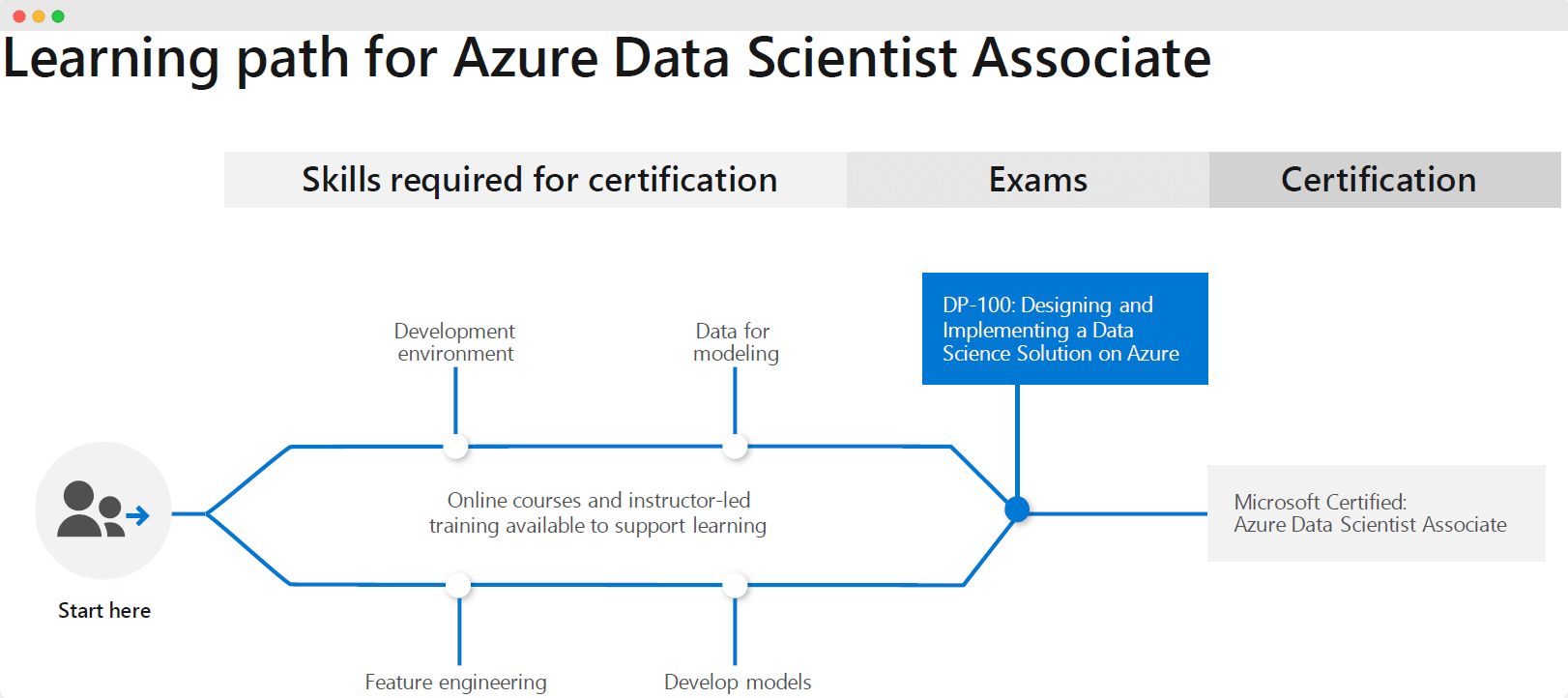
To pass the exam, you have two options. You can learn theory online (free of charge) or get an instructor who will prepare you for the certification. The costs of guided courses and certification exams are calculated depending on your location.
Online courses, boot camps, and certifications from KDNuggets
KDNuggets is one of the most influential web-based communities of data scientists, created by Gregory Piatetsky-Shapiro. Gregory is one of the top authorities in Big Data and Data Science.
The website offers various online degree programs, boot camps, certificates, and certifications. Let’s check them out.
Best Data Science Online courses
KDNuggets online data science courses have a wide range of topics. They range from basics in Data Science for working professionals looking for a career change to topic-narrow classes, such as machine learning, data and text mining, and the semantic web.
Thus, the KDNuggets list of online courses is the legit starting point of your career as a Data engineer. It includes various programs approved by KDNuggets to skill-up Big Data Analytics, big data integration, and visualization skills.
You got it right. The platform offers just one Data Mining Course, created by Dr. Gregory Piatetsky-Shapiro, the platform’s founder, and Prof. Gary Parker from Connecticut College.
However, there are courses provided by top-rated education institutions. Berkley, Boston University, and Illinois Institute of Technology, to name a few.
KDNuggets also lists online programs from online data communities, such as DataCamp and Guru99.
Best Data Science Degree programs
Data Science Bachelor degree:
- Colorado Technical University BS in CS/Data Science
- Ottawa University BS in Data Science and Technology
- Thomas Edison State University (TESU) BS in Data Science Analytics
- ASU Business Data Analytics (BS)
Data Science Master degree:
- Capella U. MS in Analytics
- Colorado State University Global AI and Machine Learning Master’s degree
- Colorado State University-Global Campus Masters of Science in Data Analytics
- Colorado Technical University Master of Science in Computer Science
- Moravian Graduate Online MS in Predictive Analytics
Best Online Data Science training, courses, and classes,
- 360DigiTMG Practical Data Science program
- Big Data University
- Booz Allen Hamilton “Explore Data Science”
- Business Toys Full Stack Data Science Professional Program
- Class Central Data Science and Big Data courses
- CMU Open Learning Initiative
- CourseBuffe
- Coursera: Machine Learning for Everyone with Eric Siegel
- DataCamp
- EMC Data Science and Big Data Analytics
- Galvanize 13-week online program
- Guru99
- InventaTeq Data Science Certification Course
- Jigsaw Academy
- JMP Statistical Thinking and Problem Solving – free online course
- LearnAnalytics India
- MIT OpenCourseWare : Data Mining
- OpenClassroom Machine Learning Course
- Oxford Machine Learning (and Deep Learning)
- Springboard Intro to Data Science
Best Data Science Boot camps
Data science boot camps are immersive programs that take from 4 to 12 weeks to complete. The main benefit of boot camps is an excellent range of activities. The studying process includes lectures, workshops, and even work on a real-life project. To participate in a boot camp, you need to send your application and pay for the program beforehand. Thus, carefully check out the submission dates. Besides this, you also should meet the organizers’ requirements.
Basic requirements for participating in Data Analytics boot camps are
- Advanced English skills (at least C1 level)
- Good abstract thinking
So, technical skills and formal education are rather “nice to have” than “mandatory” requirements. Some boot camps are accredited by educational institutions, include in-person instruction, and even provide employment support.
Here are some data science boot camps KDNuggets recommends:
- BaseCamp
- Data Science Dojo
- DataScientest
- General Assembly
- K2 Data Science Bootcamp
- Metis Data Science Bootcamps
- NYC Data Science Academy
- Peaks Academy Data Science boot camp
- Principal Analytics Prep
- The Data Incubator
- The Dev Masters
- Thinkful Data Science boot camps
Best Data Science Certificate and Certifications
Data science certificate programs give fundamental knowledge and suit beginners the most. To graduate from a certificate program, you need to learn the material, answer test questions, and receive a certificate of passing the program.
You can choose between instructor-led or self-paced certificate programs. The difference between them is that instructor-led programs are taught by an instructor via live videos, while self-paced include only learning materials and an exam at the end.
To receive a certificate in Data Science, chose among the following programs:
- Machine Learning for Everyone with Eric Siegel
- Data Science Dojo and the University of New Mexico Data Science Certificate
- Data Science Certificate
Certifications include training sessions followed by an exam. Passing a certification means you meet high industry-related standards and creates more significant opportunities to enrich your career.
Before passing the certification exam, the education provider offers learning about data science both offline and online.
For starting your data science career, consider the following data science certification online:
- Artificial Intelligence Engineer Certification
- Data Science Training and Certification
- Certified Analytics Professional
- Data Scientist Certifications
- Artificial Intelligence Certification
Which is the best data science course in Coursera?
Coursera, an online education marketplace, offers numerous options for your data science learning path. You can choose from short guided projects that length several hours to courses, professional certificates, specializations, and master degrees that take years to learn.
Coursera offers free weekly access to online courses and learning materials. In this way, you can evaluate whether the program is worth your attention before paying for it.
But the main challenge is to find the best program among 1888 courses on data science. To save you time, I sorted data science online courses on Coursera by length. Then, I searched for the top 3 most popular online data science courses from each section, and here is what I got:
3 Best Data Science guided projects
Guided projects are the best way to learn job-relevant skills within several hours. During a guided project, you receive support from a subject matter expert. One will guide you through the process of completing the task with step by step instructions. As for November 2020, the most popular guided projects on Coursera are:
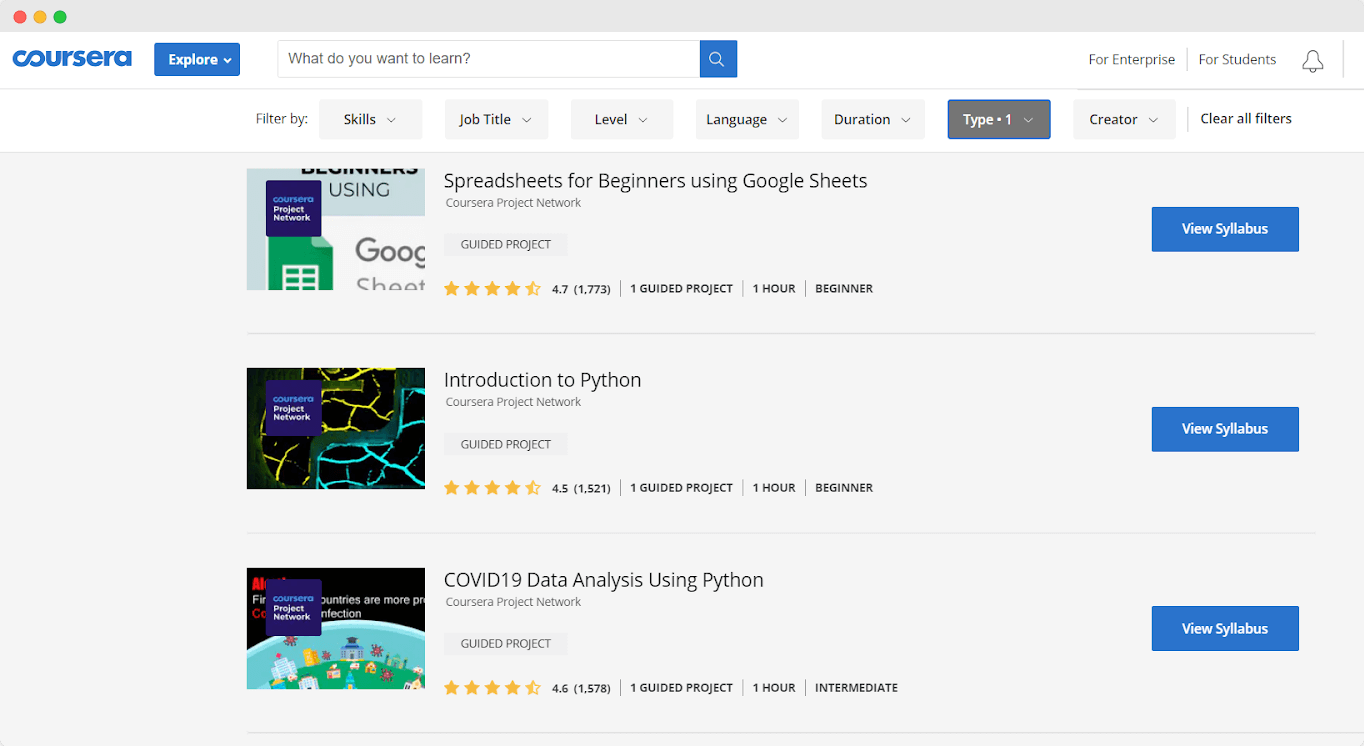
Spreadsheets for Beginners using Google Sheets
Enrolled students: 34,709
Reviews: 435
Cost: $9.99
During 2 hours you will learn the basics of working with Google Sheets.
But you can apply these skills to other spreadsheet programs, such as Microsoft Excel.
For this online course on data science, your instructor is Alex Margos. He will guide you through the following concepts:
- Working with basic data entry, formatting, and calculations
- Leveraging relative and absolute cell references
- Using concatenate, stout, sum, and other essential functions
- Working with advanced functions such as vlookup, if, and, or
- Dealing with error messages
- Applying conditional formatting, filtering, and sorting
- Visualizing data with basic charts
By the end of the project, you can apply learned concepts for visualizing household expenses.
Enrolled students: 24,223
Reviews: 260
Cost: $9.99
Introduction to Python is the second most popular guided project on Coursera. It suits beginners in data science and takes 55 minutes to complete. The course instructor is David Dalsveen, a Software Engineer skilled in C, JavaScript, and Python. With David, you will walk through the following steps:
- Introducing to Python applications
- Learning Python Variables and Input
- Working with Python Decision Constructs
- Using Python Looping
- Leveraging Python Functions
You’ll learn how to apply new knowledge in Python to create a guessing game app that puts the computer against the user.
COVID19 Data Analysis Using Python
Enrolled students: 23,348
Reviews: 315
Cost: $9.99
COVID19 Data Analysis Using Python takes 100 minutes to complete. With this program, you’ll learn how to prepare your data courses for analysis, find measures to establish for your analytics, and visualize your results.
Ahmad Varasteh, Data Mining and Machine Learning instructor will explain how to work with the COVID19 dataset. The dataset includes the cumulative number of confirmed cases per day. You will merge it with another dataset with various life factors, scored by the people living in each country worldwide. Then, you’ll find any relationship between them and visualize results. This guided program consists of the following steps:
- Importing COVID19 dataset and preparing it for the analysis
- Deciding on and calculating a measure for an analysis
- Merging two datasets and finding correlations among our data
- Visualizing our analysis results using Seaborn
3 Best online course for Data Science
To get more in-depth knowledge in a subject, try data science courses. They include recorded auto-graded and peer-reviewed assignments, video lectures, and community discussion forums. So, what data science courses do Coursera users take more often?
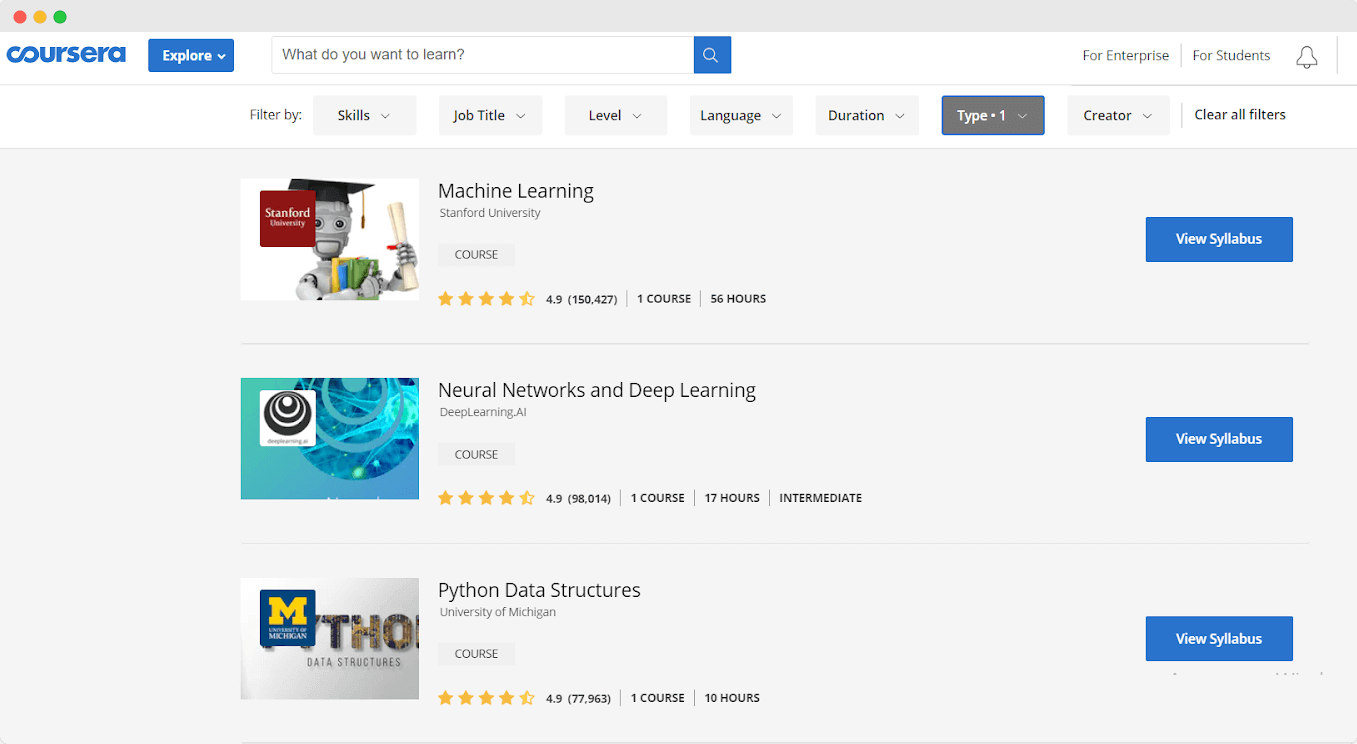
Enrolled students: 3,722,388
Reviews: 38,354
Cost: $79 per month
Machine Learning is one of those tech trends that is changing the world around us. If you want to learn how to create ML algorithms, take a Machine Learning course. The online course in data science includes an 11 week program and takes 60 hours to complete.
Machine Learning program is an introduction to machine learning, data mining, and statistical pattern recognition. It covers Supervised learning and Unsupervised learning algorithms. You’ll become familiar with building smart robots, text understanding, computer vision, and other areas.
Andrew Ng, founder of Landing AI and founding lead of Google Brain, will instruct you on machine learning during the whole program which includes:
- Week 1 Introduction, Linear Regression with One Variable, Linear Algebra Review
- Week 2 Linear Regression with Multiple Variables, Octave/Matlab Tutorial
- Week 3 Logistic Regression, Regularization,
- Week 4 Neural Networks: Representation,
- Week 5 Neural Networks: Learning
- Week 6 Advice for Applying Machine Learning, Machine Learning System Design
- Week 7 Support Vector Machines
- Week 8 Unsupervised Learning, Dimensionality Reduction
- Week 9 Anomaly Detection, Recommender Systems
- Week 10 Large Scale Machine Learning,
- Week 11 Application Example: Photo OCR
Neural Networks and Deep Learning
Enrolled students: 864,559
Reviews: 19,625
Cost: $49 per month
Neural Networks and Deep Learning are the most complex and, at the same time, the most exciting subfields of Artificial Intelligence. This course is a part of Deep Learning Specialization offered by Deeplearning.ia.
The Neural Networks and Deep Learning course takes 20 hours to complete.
Top Course instructors from Stanford University will support you on your road to Deep Learning proficiency. They are Andrew Ng, Kian Katanforoosh, and Younes Bensouda Mourri. So, what you’ll learn during this 4-week course?
- 1 Week Introduction to deep learning
- 2 Week Neural Networks Basics
- 3 Week Shallow neural networks
- 4 Week Deep Neural Networks
Enrolled students: 677,472
Reviews: 13,757
Cost: $49 per month
The Python Data Structures course is a part of Python for Everybody Specialization, provided by the University of Michigan. The course will introduce you to the core data structures of the Python programming language. In 19 hours, you’ll learn the basics of procedural programming and how to leverage Python for built-in data structures and perform sophisticated data analysis.
At the end of the course, you’ll know the principles of data structures and how to apply them. You’ll be able to write code for apps and use Python dictionaries for storing data.
Charles Russell Severance, a Clinical Professor from the School of Information, will be your course instructor. The course includes a 7-week program, based on Chapters 6-10 of the textbook “Python for Everybody”:
- 1 Week Chapter Six: Strings
- 2 Week Unit: Installing and Using Python
- 3 Week Chapter Seven: Files
- 4 Week Chapter Eight: Lists
- 5 Week Chapter Nine: Dictionaries
- 6 Week Chapter Ten: Tuples
- 7 Week Graduation
3 Best Data Science specializations
In the Coursera Specialization section, you will find programs to master specific skills for your career. Each specialization includes a series of video courses and hands-on projects. At the end of every specialization program, you’ll earn a Specialization Certificate.
The top 3 most popular specialization programs are:
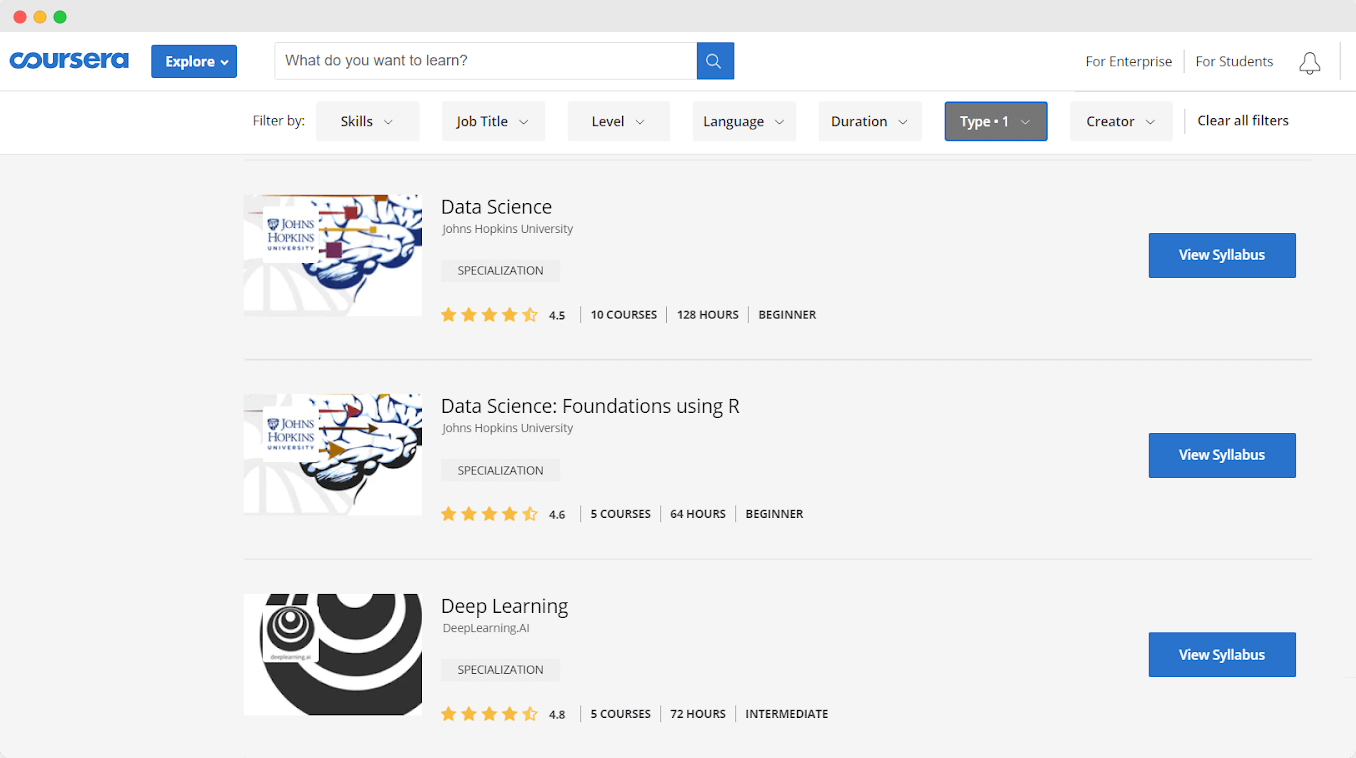
Enrolled students: 407,031
Reviews: 15,786
Cost: $49 per month
Data Science specialization, offered by Johns Hopkins University, includes 10 courses for beginners with previous Python experience. If you study for 7 hours each week, you can complete this specialization in 11 months.
With Data Science Specialization, you’ll learn how to build a data science pipeline from the ground-up.
For the final Capstone Project, you’ll apply new skills and knowledge, creating a data product using real-world data.
Four instructors from the Bloomberg School of Public Health will guide you through the specialization. They are Jeff Leek, Ph.D., Roger D. Peng, Ph.D., and Brian Caffo, Ph.D. Now, let’s take a look at the courses this specialization includes.
- Course 1 The Data Scientist’s Toolbox
- Course 2 R Programming
- Course 3 Getting and Cleaning Data
- Course 4 Exploratory Data Analysis
- Course 5 Reproducible Research
- Course 6 Statistical Inference
- Course 7 Regression Models
- Course 8 Practical Machine Learning
- Course 9 Developing Data Products
- Course 10 Data Science Capstone Project Class
To get a certificate, you’ll have a portfolio demonstrating their mastery of the material.
Data Science: Foundations using R Specialization
Enrolled students: 66,419
Reviews: 13,189
Cost: $49 per month
Data Science: Foundations using R Specialization, the second most popular specialization in data science, takes 5 months to complete.
You’ll learn about core data science tools and techniques, how to get clean, and explore data, and R programming. Apart from that, this specialization includes peer review assignments. At the end of each course, you need to complete a project to show your new skills.
Your instructions are Jeff Leek, Ph.D., Roger D. Peng, Ph.D., and Brian Caffo, Ph.D. from Bloomberg School of Public Health. As for the learning program, it includes 5 courses from Data Science Specialization we previously mentioned.
- Course 1 The Data Scientist’s Toolbox
- Course 2 R Programming
- Course 3 Getting and Cleaning Data
- Course 4 Exploratory Data Analysis
- Course 5 Reproducible Research
After you finish this program, you can continue your learning path with the Statistics and Machine Learning specialization.
Enrolled students: 540,049
Reviews: 38,851
Cost: $49 per month
Deep Learning specialization gives in-depth knowledge about deep learning algorithms and their applications.
During 4 months, you will pass 5 courses and learn about building neural networks, starting successful machine learning projects, and anything in between. You will master your theoretical knowledge in Python and TensorFlow with real projects to become a market-ready AI specialist.
The Specialization instructors are – Andrew Ng, Kian Katanforoosh, and Younes Bensouda.
They will guide you through 5 courses of this specialization:
- Course 1 Neural Networks and Deep Learning
- Course 2 Improving Deep Neural Networks: Hyperparameter tuning, Regularization, and Optimization
- Course 3 Structuring Machine Learning Projects
- Course 4 Convolutional Neural Networks
- Course 5 Sequence Models
To earn your certificate, you need to finish hands-on projects at the end of each course successfully.
Top 3 Data Science Master Degree
Master degree programs available on Coursera are your perfect choice if you want to study at top universities online. The main benefit of master’s degree programs is lower costs compared to on-campus learning. While paying less, you receive the same credential as students who attend class on campus. Let’s look at the top 3 master’s degree programs in data science.
Online Master of Computer Science from the University of Illinois
Length: 12 – 36 months
Courses: 32 credit hours (8 courses)
Cost: $21,440
The Master of Computer Science in Data Science (MCS-DS) program includes mastering skills for starting your data science career. With MCS-DS, you’ll learn how to apply machine learning, data mining, data visualization, and cloud computing. The program also includes interdisciplinary data science courses from the Department of Statistics and the School of Information Sciences.
You’ll learn how to apply mathematical foundations, algorithmic principles, and computer science theory to real-world problems. You’ll also study how to identify the computing requirements appropriate for solving those problems.
The degree program includes mastering skills for designing, implementing, and evaluating computer-based systems, processes, components, and programs.
Master of Data Science from National Research University Higher School of Economics
Length: 20 – 24 months
Courses: 18 Courses + 3 Projects
Cost: 675,000 – 1,350,000 RUB
The Master of Data Science offered by National Research University Higher School of Economics is an English-taught program, though 100% online. All meetings and live class sessions are organized in Slack and Zoom. The course includes leveraging Python programming language for practical assignments, shared via Github.
The curriculum includes mastering analysts, data and computer science, software engineering, and machine learning skills. You can select the degree specialization among three options:
- Data Scientist
- Machine Learning Engineer
- Researcher in Data Science
Online Master of Computer Science from Arizona State University
Length: 18-36 months
Courses: 10 courses
Cost: $15,000
The Master of Computer Science (MCS) degree program from Arizona State University offers a well-balanced combination of theoretical and practical assignments. The degree program covers such topics as artificial intelligence, blockchain, big data, and cybersecurity. By taking this master’s degree program, you’ll receive the same knowledge as students who study the program on-campus.
With this program, you’ll learn about performing computer analysis, information transfer systems, and computational processes. The curriculum also covers cloud platforms’ leverage for increasing productivity, solving problems in automated planning and scheduling. After graduating from the degree program, you’ll be able to create search engines, systems of biomedical information, and package distribution systems.
Data science certifications online: the final word
The learning path of data science may look like an endless highway for a beginner. But remember that all things worth attention take time. Thus, don’t try to learn everything in a day.
You can start by learning data science fundamentals on specialization programs and online data science courses. Then, you can take certification programs to find and fill in the knowledge gap. For polishing your practical skills, participate in boot camps. You can also take guided programs.
But promise me, you’ll never give up.
If you find this article with the best data science programs useful, I’ll be glad if you’ll share it with your friends on Facebook and LinkedIn.
